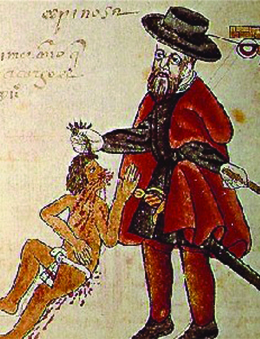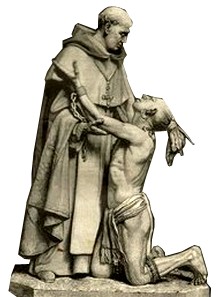

I wonder how it read in the Spanish imperial court? The warning of the native nobleman who fled from Hispaniola to tell the natives of Cuba about the danger they faced from the Spanish deserves to be the last word.

What made this the man so different from his co-religionists responsible for the above list? A morality arising from his upbringing? A sense of compassion perhaps based on genetics? Or on rational thought? Or simply fear of Judgment Day? How could the same culture, upbringing and system of belief produce both good such as Las Casas and the evil as the conquistadors? A question much reflected on but as unanswerable today as it has ever been. I can well understand that Las Casas deserves as much respect as any witness to the Holocaust more familiar to our age. I disappoint myself at never before having heard of Las Casas, whom Wikipedia tells me is regarded as one of the first proponents of the idea of universal human rights. The index entry under “torture and death” in “A Short Account of the Destruction of the Indies” is as eloquent about the fate of the native people of the Americas on first meeting the Spanish conquistadors as any review I could write: Las Casas is often seen as one of the first advocates for universal Human Rights His efforts resulted in several improvements in the legal status of the natives, and in an increased colonial focus on the ethics of colonialism. Sepúlveda countered that they were less than human and required Spanish masters in order to become civilized.īartolomé de las Casas spent 50 years of his life actively fighting slavery and the violent colonial abuse of indigenous peoples, especially by trying to convince the Spanish court to adopt a more humane policy of colonization. In 1550 he participated in the Valladolid debate he argued against Juan Ginés de Sepúlveda that the Indians were fully human and that forcefully subjugating them was unjustifiable. The remainder of his life was spent at the Spanish court where he held great influence over Indies-related issues.

He was appointed Bishop of Chiapas, but served only for a short time before he was forced to return to Spain because of resistance to the New Laws by the encomenderos, and conflicts with Spanish settlers because of his pro-Indian policies and activist religious stances. Traveling back to Spain to recruit more missionaries, he continued lobbying for the abolition of the encomienda, gaining an important victory by the passing of the New Laws in 1542. He then traveled to Central America undertaking peaceful evangelization among the Maya of Guatemala and participated in debates among the Mexican churchmen about how best to bring the natives to the Christian faith. In 1522 he attempted to launch a new kind of peaceful colonialism on the coast of Venezuela, but this venture failed causing Las Casas to enter the Dominican Order and become a friar, leaving the public scene for a decade. Later in life, he retracted those early views as he came to see all forms of slavery as equally wrong. In his early writings he advocated the use of African slaves instead of Natives in the West-Indian colonies consequently, criticisms have been leveled at him as being partly responsible for the beginning of the Transatlantic slave trade. In 1515 he reformed his views, gave up his Indian slaves and encomienda, and advocated, before King Charles V, Holy Roman Emperor, on behalf of rights for the natives. He became the first resident Bishop of Chiapas, and the first officially appointed "Protector of the Indians." His extensive writings, the most famous being A Short Account of the Destruction of the Indies and Historia de Las Indias, chronicle the first decades of colonization of the West Indies and focus particularly on the atrocities committed by the colonizers against the indigenous peoples.

(November 1484 – 18 July 1566), was a 16th-century Spanish historian, social reformer and Dominican friar.


 0 kommentar(er)
0 kommentar(er)
